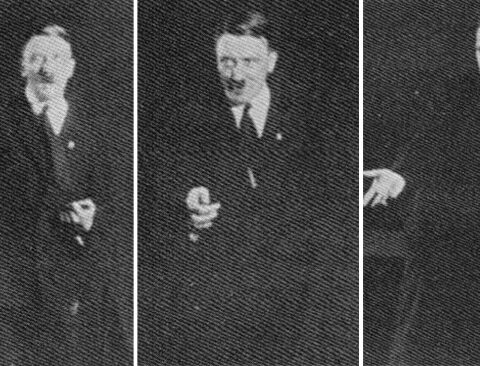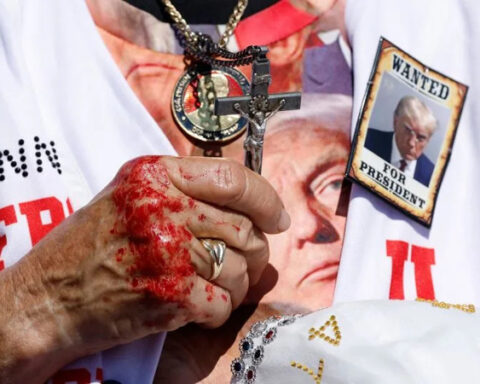My latest book was written from an Anglo-Identitarian perspective. I try to demonstrate that a pan-British race patriotism can be rekindled by a reformed, neo-Angelcynn (Old English for “kin of the Angles”) church. Such a reformation would provide a desperately needed theopolitical alternative to the hegemonic, universalist model of creedal Christianity. Nowadays, as we have just seen, even American Christian nationalism routinely invokes the deracinated, disembodied Lordship of global Jesus as its heavenly warrant.
Lost Sheep: American Christian Nationalism as a Problem in Geopolitical Theology[1]
Introduction
Christian nationalism has become a hot, and divisive, topic among evangelical Protestants in the USA. Problems arise for American Christian nationalists and their enemies alike, because the movement subordinates all “nations” (typically defined in civic, as opposed to racial or ethnic, terms) to a divinely ordained mission to procure for themselves both earthly and heavenly goods “in Christ.” “National” identity is, therefore, not a good in and of itself, grounded in blood and belonging. Only through the grace bestowed upon it by God, as revealed in Scripture, can a nation be perfected.
The manifest destiny of all nations, in other words, will be realized in history as they embrace the universal truths of the Christian religion. This doctrine was invoked recently in an article which appeared on two Christian websites, Iron Ink and Tribal Theocrat. The immediate point of the piece was to defend the “dissident Christian right” against the charge that Christian nationalism is little more than a “woke right” heresy. The case for the defence, as set out by the pseudonymous author (“jetbrane” or “Enos Powell,” take your pick), rests upon a description of the ontology, epistemology, anthropology, teleology, and axiology of the “dissident Christian right.” This brief but wide-ranging survey leads the author (whose real name is Bret McAtee, pastor of a small church in Michigan) to the conclusion that every facet of the Christian nationalist “worldview,” is set in radical and permanent opposition to the “hard woke worldview.” The latter position, McAtee declares, “is always about the glory of man as determined by some Christless God hating elite.”
In sharp contrast, for Pastor McAtee, it is axiomatic that the Weltanschauung of the dissident Christian right “advocates the Crown Rights of the Rightful Rule” of the Lord Jesus Christ “over every area of life.” He contends that the accusation that Christian nationalism is just another manifestation of the woke right fails “because the dissident right’s worldview includes an extra-mundane personal and authoritative God who “created all things in six days and all are very good.” According to the pastor, the dissident Christian right necessarily bows “to God’s determination of reality.” Its “ultimate value … is the glory of God and His Christ.” Biblical Christianity, the pastor assures us, is anchored providentially in a universal “history directed towards the postmillennial end of God’s Kingdom being built up on planet earth” in fulfillment of God’s plan “to have the Kingdoms of this earth become the kingdoms of our Lord and His Christ.”
Attending a Christian Nationalist Conference
Now, whatever one makes of McAtee’s defence of the dissident Christian right, there is no denying that he reflects the dominant mindset among Anglo-American Christian nationalists. I came face-to-face with that reality when I decided to attend the recent Right Response Ministries conference in Texas (devoted to “Defeating Trash World”). I felt as if I had entered a theological bubble, hermetically sealed within the historical creeds and a biblical hermeneutic impervious to scholarly criticism.
In fact, in the months leading up to the conference, I found it impossible to receive permission (or even acknowledgement of my request) from Joel Webbon—the pastor organizing the event—to set up a table displaying my new book. I even had Amazon.com send him a copy of the book, entitled Christian Nationalism vs Global Jesus: Projects of Peoplehood from Biblical Israel to the Collapse of British Patriotism. Admittedly, such a title suggests strong dissent from the outworn axioms of creedal Christianity. I had hoped, however, that a display table would spark some interest and provide an opportunity to defend the book in conversation with speakers and attendees at the conference. When I finally arrived at the conference with a box of books (obtained at half price from Arktos), I asked the pastor’s administrative assistant, if I might be able to set up a small table to display them. After an hour or so, not having received a response, I asked her again whether permission might be forthcoming. She told me flatly that it would not be possible since that facility was available only for conference sponsors. This explanation later seemed a bit misleading since I noticed that at least two tables already laden with books and related material were occupied by podcasters who were unlikely to be “conference sponsors.”
Making the best of it, I decided to use the ticket my wife had purchased for the conference (which due to health concerns she didn’t use) to claim a chair for my own use as a sort of surreptitious Samizdat Stall to display my own books. Serendipitously, one person who did notice the stall, with copies of my Christian Nationalism vs Global Jesus book in plain view thereupon, was Pastor Joel’s wife. As we were talking, she pointed to my book, remarking that her husband had received a copy of it at his church a few weeks earlier. Shortly afterwards, the Pastor himself happened by (rather conspicuously ignoring my samizdat book display) and asked my name. I introduced myself before (much to my satisfaction) his wife drew her husband’s attention to the book, reminding him that he had already received a copy of his own. Pastor Webbon, however, made no use of the opportunity to acknowledge receipt of said book, much less discuss it, and hastily made his departure.
This rather abrupt brush-off came as no real surprise to me since (even during the period not so long ago when I was studying for a degree in theology) I have always found that orthodox Christian believers seem remarkably reluctant to engage in a dialogue with anyone they perceive as an unbeliever or heretic. Such intellectual insularity is doubly unfortunate among self-declared “Christian nationalists” who aim to gain political power to re-establish Christianity in the public square. Not a great strategy, in other words, for a movement that will need to make friends and influence people to achieve its political objectives.
In my own case, as I tried to make clear in my book, I look upon the position taken by Christian nationalists in the culture wars with a great deal of sympathy. Indeed, as a cultural Christian, I want to see all Anglo-Protestants throughout the length and breadth of the Anglosphere unite in a broad church to wage that struggle. I strongly suspect that Pastor Webbon may have glanced through his copy of my book, only to dismiss it summarily as damnable heresy. Judging by another Iron Ink article, Pastor McAtee, too, doubts that I am “a Christian in any traditional, orthodox, or historical sense.” Pointedly, he adds that it “stands to reason” that Pastor Webbon “wouldn’t give him a book table to hawk his books. I wouldn’t either. Christians don’t promote non-Christianity at their conferences.”[2]
Christian Identities
Perhaps, if Christian identity turns solely upon fidelity to the creeds, I should be denied entry into the fold. On the other hand, as the author of a book entitled Dissident Dispatches: An Alt-Right Guide to Christian Theology, am I not entitled to a presumptive claim to be a member of the dissident Christian right? In any case, Ehud Would, of Faith & Heritage fame, appears to have recognized me as such in his thoughtful and generally favourable review of Dissident Dispatches back in 2017. Surely, doctrinally rigid, creedal Christians are no more authentically Christian than cultural Christians who dissent from received orthodoxy.
Just as there is more than one way to skin a cat, there has always been more than one way to conceive and constitute a Christian nation. The nation that was created by the Loyalists who fled to Canada was no less “Christian” than the revolutionary republic created by the American rebels who forcibly drove those loyal to the British Crown from their own homes and native land.
I was born a British subject before the creation of Australian or Canadian citizenship, at a time when Anglo-Saxons still counted as one of Canada’s two “founding races.” As a consequence, my intellectual development has been greatly influenced by the strange demise of both British Canada and British Australia.
Accordingly, my latest book was written from an Anglo-Identitarian perspective. I try to demonstrate that a pan-British race patriotism can be rekindled by a reformed, neo-Angelcynn (Old English for “kin of the Angles”) church. Such a reformation would provide a desperately needed theopolitical alternative to the hegemonic, universalist model of creedal Christianity. Nowadays, as we have just seen, even American Christian nationalism routinely invokes the deracinated, disembodied Lordship of global Jesus as its heavenly warrant.
Following the crushing defeat of German ethnonationalism in 1945, the global Jesus of contemporary Anglo-Protestant theology achieved virtually uncontested hegemony. Today, almost all mainstream Anglo-Protestants reject even the mildest manifestations of ethnic particularism as tantamount to racism. Indeed, the advocacy of “Christian nationalism” is denounced regularly from the pulpits of mainline Anglo-Protestant churches in the United States.
Clearly, avowed Christian nationalists in the USA are now held hostage by global Jesus. Christian nationalism piously declares itself bound to affirm that the telos of human history will be realized only when the primary allegiance of all nations is to King Jesus. It remains to be seen, however, whether a distinctively white Anglo-Saxon Protestant ethnoreligious identity can be squared with the ahistorical, universalist reign of Lord Jesus. Even Stephen Wolfe, the most prominent American Christian nationalist, downplays, when not outright denying, the intractably biocultural dimension of Anglo-Saxon identity. He has suggested, for example, that even black men such as Booker T. Washington and Justice Clarence Thomas (who happens to be a devout Catholic) have been assimilated into the Anglo-Protestant ethnonation.
Christianity as Ethnoreligion?
By contrast, my thesis is that an exclusive ecclesiastical allegiance to a generic cosmic Christ reduces the distinctive character of every earthly ethnoreligious identity to mere adiaphora (i.e., things inessential in the eyes of the church). The rebirth of Anglo-Protestantism requires a solid ethnoreligious foundation, as did the first-century Jesus movement. The refusal of hidebound American evangelicals to recognize the unique ethnonational identity of the historical Jesus is the outdated legacy of historically Romanised ecclesiastical establishments, Protestant and Catholic alike. My argument, therefore, is that Anglo-Saxon Christianity should be re-Germanized by re-imagining the Angelcynn church of Alfred the Great to fit the needs of our own age.
Christian Nationalism vs Global Jesus presents persuasive evidence that the Hebrew Bible (most likely created between the fifth and second centuries BC) produced a poignant and powerful national narrative. Conceived by Judean scribes as a pedagogic tool, that biblical narrative inspired the “project of peoplehood” presupposed by the Jesus movement of the first century AD.
Anglo-Protestants desperately need to recover earlier folkish variants of the Christian tradition. I suggest that the focus of Anglo-Protestantism needs to be shifted away from its long-standing preoccupation with personal salvation in the world to come. Anglos need a sense of rootedness in networks of ethnoreligious communities in which shared ancestry matters as much if not more than doctrinal purity. Ethno-religious ties provide the institutional precondition and moral foundation for socially cohesive communities, be they local (the Amish, for example) or global (such as the Jews). Anglo-Protestant churches, too, could become the ethnoreligious heart of breakaway parallel societies. Such communities will be devoted not just to producing healthy, happy, and morally upright families; they will also generate British-descended counter-elites set in opposition to the irresponsible corporate plutocracy now misgoverning the Anglosphere.
It may be that Anglo-Protestants will someday receive as King a Christ of their own. But, as preterist scholar Don K. Preston often remarks, he is unlikely to return as a 5’5” Jewish man whose name is Jesus. That fact need not preclude the miraculous appearance of our own Patriot King, were he to become incarnate in Australia and the other British dominions.
Conclusion
In short, there is a pressing need for a sympathetic but penetrating critique of the hitherto unchallenged hegemony of global Jesus within the theopolitical imagination of the emergent Christian nationalist movement. American Christian nationalism is a predominantly Anglo-Protestant movement. Like the first-century Jesus movement, it can and should embrace, explicitly, its distinctive ethnoreligious character outside and apart from both the state and creedal Christianity.
Neither Jesus nor Paul aimed to create a new religion. They sought instead to save the “lost sheep of Israel.” Like everyone else in Greco-Roman antiquity, they took it for granted that ethnicity and religion were synonymous categories. Paul, for example, became the “apostle to the pagans” because he believed that the descendants of the ten lost tribes who had been absorbed into the pagan world could have their “spiritual DNA” as Israelites reactivated “in Christ.” Contemporary biblical scholarship often describes Jesus and Paul as historical figures working “within Judaism” or “within Israeliteism.” In other words, their efforts to spark “the resurrection of Israel” were part and parcel of the “project of peoplehood” pioneered by the Hebrew Bible.
Today’s Christian nationalists should recognize WASPs throughout the Anglo-Protestant diaspora as an “invisible race” much like the “lost sheep of Israel.” Anglo-Americans (along with Anglo-Canadians, Anglo-Australians, and Anglo-Kiwis) are, in effect, the “lost sheep of Greater Britain.” American Christian nationalists should seek salvation, together with their co-ethnics in the former British dominions, in a post-modern “project of peoplehood” seeking to bring the idea of their Patriot King down to earth.
Acting together, faithful Anglo-Protestants could spark the spiritual reformation of the entire Anglosphere. Such a religious movement could provide the solution to an existential problem in geopolitical theology. Anglo-Protestants everywhere need to understand themselves as a tribal network facing extinction if the corporate state apparatus of the global American empire is left unchecked. Anglo-American Christian nationalists, especially, should grasp the opportunity to embrace an ancestral British race patriotism, in solidarity with co-ethnics in the United Kingdom, Australia, Canada, and New Zealand still owing allegiance to the Crown.
A neo-Angelcynn movement grounded in orthopraxis rather than strait-laced orthodoxy will be able to attract nominally secular, cultural Christians alienated from contemporary churches. While resistant to unconditional belief in the established Christian creeds and confessions, WASPs are typically more likely to be receptive to a “modernized” folk religion in which the church serves, first and foremost, as a teacher of morality. Deracinated Anglo-Protestants have long been accustomed to treating moral behaviour merely as a stepping stone towards individual salvation. A folkish practical theology would instead gather WASPs together in moral communities, resurrecting an ancestral project of peoplehood with its shared history and destiny. In so doing, neo-Angelcynn churches could bring to fruition the objectives of men such as Sir John Robert Seeley who pioneered the Broad-Church movement in the nineteenth century Church of England.
In our own time, the need for such a movement has never been more urgent. Young Anglo-Protestants, along with their agnostic contemporaries, are having their future stolen from them by a plutocratic corporatist regime destroying every institution that could provide access to stable, prosperous, middle-class family lives of purpose and meaning. In the medium- to long-term, their rising discontent could find a significant institutional outlet in an Anglo-Identitarian Christian movement. Explicitly Anglo-Protestant churches, schools, colleges, even hospitals, could cultivate the British-descended elites necessary to challenge, not just “Big Eva,” the power centre of American evangelical Protestantism, but also—and more importantly—the unapologetically ethnocentric, “market-dominant minorities” now entrenched within every once-proudly Anglo-Saxon country. The revival of such a Greater British, Broad-Church movement will expose the weaknesses of a parochial, American-style Christian nationalism setting the mythology of global Jesus over loyalty to co-ethnics, both at home and throughout the Anglosphere.
[1] This is a revised and expanded version of an earlier essay which appeared at: https://counter-currents.com/2025/05/the-problem-with-christian-nationalism-american-style/





